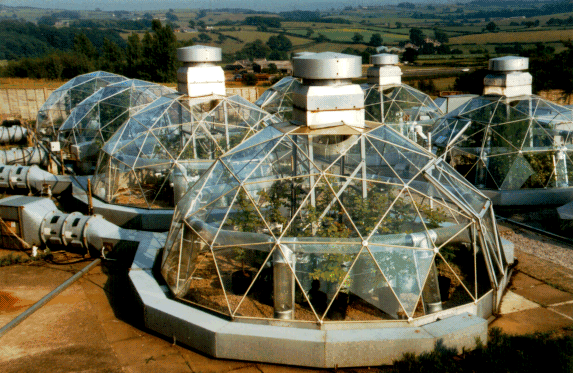
For over 30 years, Lancaster University has been a centre of research
directed at the effects of air pollutants, UV-B radiation and elevated
CO2 concentrations on plants. Much of this work has been carried out at
the site of the APCCU, at the southern end of the university campus.
A prominent feature of the facility is the suite of 20 specially designed
glasshouses ("Solardomes"). These
have been particularly important in enabling larger scale experiments to
be carried out on trees and other perennial species,  which
are grown under natural light and ambient temperatures, and can be exposed
to closely controlled pollution regimes for several consecutive seasons.
In addition, a range of indoor plant growth chambers has been developed,
in which temperature, light, humidity, and air pollution can be closely
regulated.
which
are grown under natural light and ambient temperatures, and can be exposed
to closely controlled pollution regimes for several consecutive seasons.
In addition, a range of indoor plant growth chambers has been developed,
in which temperature, light, humidity, and air pollution can be closely
regulated.
The Solardomes provide an excellent facility for studying the long-term
effects of climate change on vegetation, under realistic conditions. Within
these chambers we can manipulate the temperature, CO2 concentration, and
availability of water and nutrients. Much of our work is carried out on
native British trees and species from local upland ecosystems. Detailed
physiological measurements, providing important information on the response
mechanisms of individual species to climate change, are integrated with
broader studies of plant communities and ecosystem processes. We are also
interested in the complex changes which increased CO2 brings about in the
food quality for herbivorous insects and the consequences for plant performance.
Researchers at the APCCU have provided a major contribution to the understanding
of air pollution effects on plants. Until the mid 1980's much of this work
was concerned with the effects of SO2 and NOx on crops and grasses. Since
then the major focus of our research has been on the effects of ground-level
ozone on vegetation, particularly tree species, and on interactions between
this pollutant and other stresses such as drought, frost and damage by
insect pests. A multidisciplinary approach involving plant physiologists,
biochemists and entomologists has greatly advanced our understanding of
these and other important interactions. Significant findings attributed
to summer ozone exposure include a reduction in the ability of trees to
control their water status during drought and the increased sensitivity
of trees to early winter frosts. Work has also shown that the pest potential
of insect species, particularly aphids, is enhanced in polluted conditions.
UV-B research at APCCU started in 1990 and expanded to become one of
the premier facilities in Europe. Much UV-B research has used simple methods
that can lead to unnatural plant responses. We have developed one of the
very few "modulated" field irradiation systems in which UV-B additions
are constantly adjusted to maintain a fixed percentage above ambient sunlight,
regardless of cloud, time of day, etc. Such sophisticated systems are considered
to be "state-of-the-art" in terms of simulating natural environments and
determining realistic responses.
Some current projects at the APCCU:
Seasonal variability in sensitivity of beech to ozone (T.
A. Mansfield)
Cucumber growth and damage under elevated CO2 (W.
J. Davies)
Quantification
of soil carbon inputs under elevated CO2 (G.
Kerstiens)
Impacts
of rising CO2 on soil biological diversity (R.
G. Bardgett)
Partial root drying: a sustainable irrigation system for efficient
water use without reducing fruit yield (W.
J. Davies)
Address
Air Pollution & Climate Change Unit
Department of Biological Sciences
Lancaster University
Lancaster
LA1 4YQ
UK
Tel: +44 (0)1524 594496
Fax: +44 (0)1524 594379
People at the APCCU
Superintendent:
Maureen
Harrison (direct dial 01524 594496)
Academic Co-ordinator:
Dr
Gerhard Kerstiens (direct dial 01524 593462)
Technicians:
Anne
Keates (direct dial 01524 594496)
Research Associates based at the APCCU:
Dr James E. R. Heath (direct dial 01524 594586)
Last update: 2 August 2002
Please send comments to g.kerstiens@lancaster.ac.uk
 which
are grown under natural light and ambient temperatures, and can be exposed
to closely controlled pollution regimes for several consecutive seasons.
In addition, a range of indoor plant growth chambers has been developed,
in which temperature, light, humidity, and air pollution can be closely
regulated.
which
are grown under natural light and ambient temperatures, and can be exposed
to closely controlled pollution regimes for several consecutive seasons.
In addition, a range of indoor plant growth chambers has been developed,
in which temperature, light, humidity, and air pollution can be closely
regulated.
